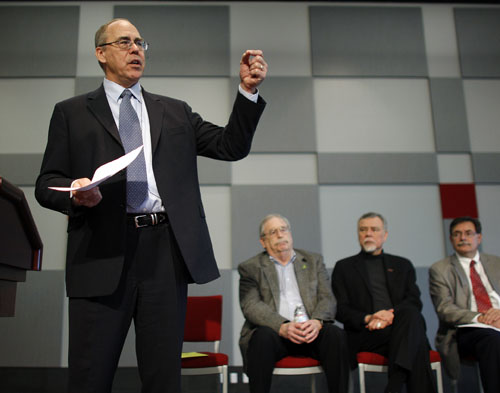UNLV facing job losses
UNLV will offer yet another round of buyouts, will eliminate departments and jobs, and will further reduce support services for students in an effort to trim an estimated $9 million more from its budget, the university's president told a huge gathering Tuesday.
"We will lose some departments," President Neal Smatresk told more than 500 people at a town hall meeting about state-imposed budget cuts. Many workers in those departments will lose their jobs.
Smatresk said no decisions have been made on which departments or how many of them will be eliminated. He noted that a list that has been circulating of the 20 most expensive departments at the university -- many of them science programs -- is a starting point. But it is that only. He said the departments that are ultimately eliminated may or may not come from that list.
Earlier Tuesday, a university spokesman said five to seven of the 20 departments are being considered for elimination.
A committee of administrators, faculty and students is meeting to go over which departments to eliminate. Smatresk said a final decision will be ready in June.
The cuts come as state lawmakers trimmed the higher education system's state-funded budget by 6.9 percent amid a statewide budget shortfall.
At the University of Nevada, Reno, administrators took another tack, announcing that they plan to close one college and eliminate several programs to deal with the cuts. But even those cuts are dependent on what the higher education system's governing Board of Regents does.
The regents are scheduled to meet this week to discuss how to implement cuts systemwide. The board is expected to spread the cuts evenly among the universities and colleges.
Smatresk said UNLV will have to save an estimated $9 million. Of that, he hopes to cut $4 million from academic programs and $5 million from support services.
He said exactly how much the university will have to cut will depend partly on the regents. The more the regents cut from the system office, the less each college and university will have to cut.
How much UNLV will have to cut from academic programs also will partly depend on how much money is saved through the buyout program, set to go into effect next month.
Smatresk said the university will try to find other jobs for tenured faculty who work in departments that are eliminated. Nontenured faculty will lose their jobs. Classified employees -- who work for the state, not the higher ed system -- may be allowed to transfer to another state government position, depending on seniority.
"I know there will be groups of people who will lose their jobs in this process," he said.
Smatresk has said the university has already eliminated several small departments with few students, so not much money was saved.
"What we have left are programs with students in them, faculty still in them, graduate students in them," he said.
The average cost of each of the programs on the 20 most expensive list is about $10,000 per full-time student. Some programs can cost as little as $2,000 per full-time student.
Smatresk has been pushing for a differential tuition model, which would charge students in expensive programs more than it charges the rest of the student body. The regents have yet to act on the proposal.
Smatresk also noted that closing a department does not produce immediate savings. In order to remain an accredited university, students within a program must be given a reasonable amount of time to finish. That means cost savings accumulate as the program shrinks over several years and ultimately disappears.
Accreditation is vital to a university, not only to preserve its reputation as a legitimate institution of higher learning, but also because losing accreditation would mean losing access to all federal financial aid. Approximately three-fourths of UNLV students receive some form of financial aid.
System Chancellor Dan Klaich said he will not recommend an increase in student tuition and fees to cover the cuts. The fees have risen 39 percent in the past five years, and an additional 10 percent increase is set to go into effect next year.
Klaich said he might favor an increase that would help cover the delay in the savings found by eliminating a department.
He also will not recommend that the system declare financial exigency, which would be similar to declaring bankruptcy. Such an emergency declaration would allow the board to implement systemwide layoffs and salary cuts.
Without the declaration, the board cannot do either. But, Klaich said, he expects the board to discuss changing the system's code to allow such a move in the future.
That is because most people within the state's higher education system expect more cuts in the future. The state's economic outlook, according to the experts, is bleak.
The cuts so far have been bad, Smatresk told the gathering of students, faculty and staff Tuesday, but they could get worse.
"Make no mistake. Nothing more than the future of higher education was at stake this year, and I'm worried because I believe it will be at stake again. The future of higher education is threatened."
Contact reporter Richard Lake at rlake@reviewjournal.com or 702-383-0307.

















